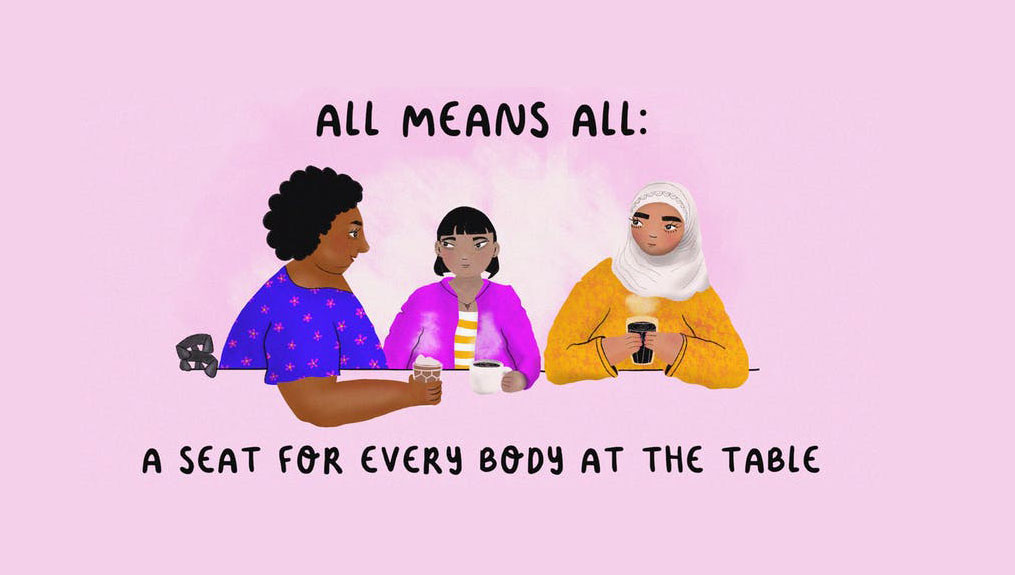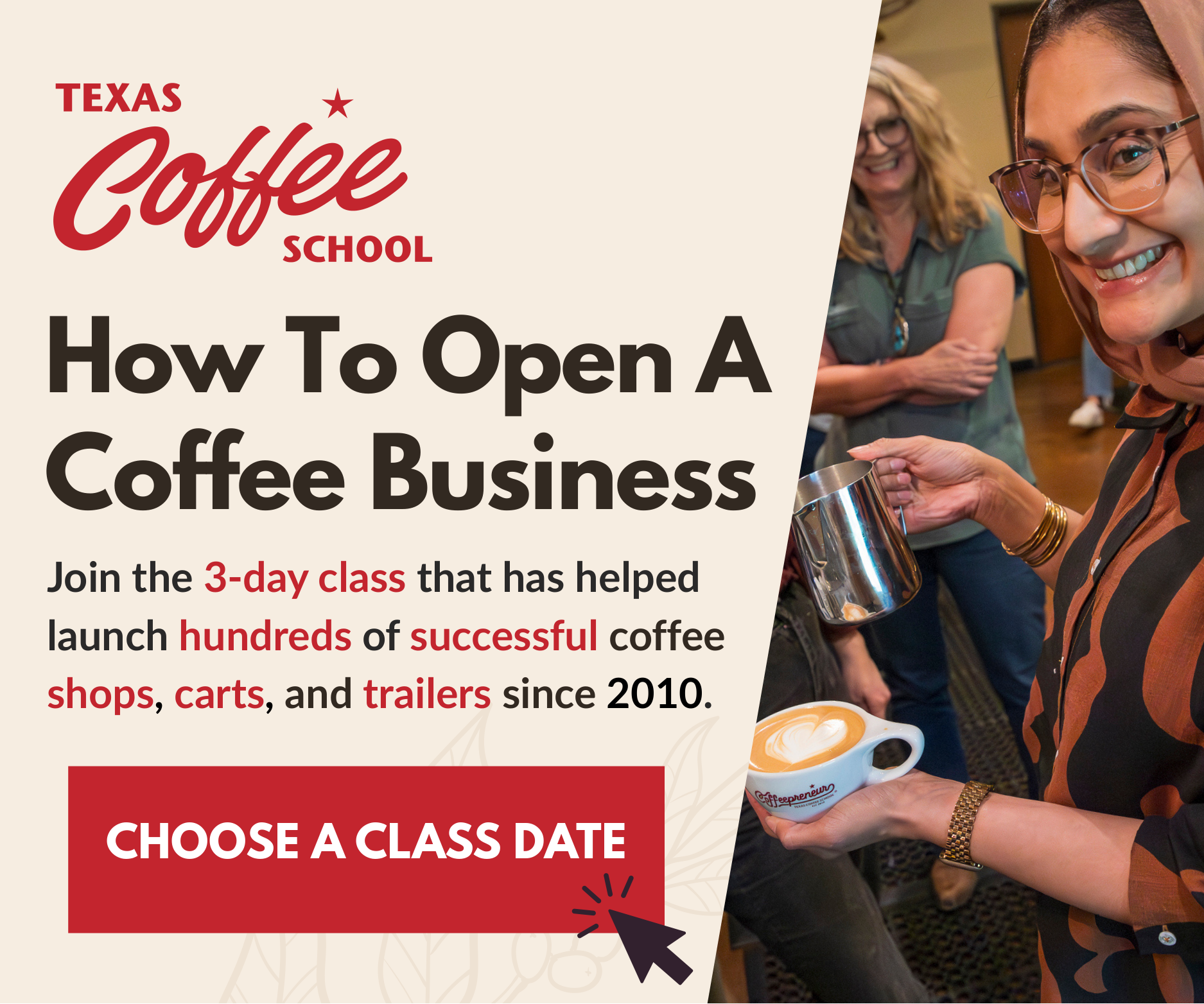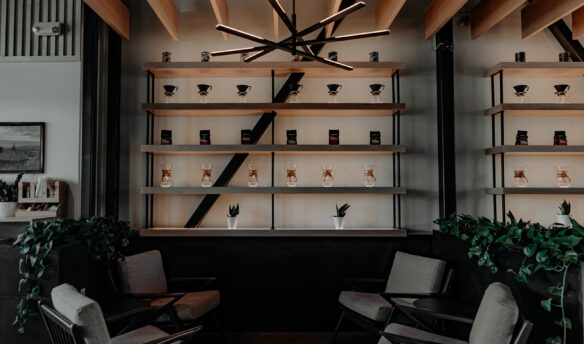“Do the best you can until you know better. Then when you know better, do better.” –Maya Angelou
[O]n Thursday, May 9, an intimate group gathered at Nossa Familia Coffee’s Seven Corners location for “All Means All: A Seat for Every Body at the Table,” an event dedicated to addressing topics surrounding body size diversity, equity, and inclusion. Featuring a panel of consultants, community educators, activists, and design experts, the event explored how an intentional approach to organizational culture and physical layout and design can make room for every body in a space.
Moderated by Dan B, café supervisor for Nossa Familia, the panel featured: SJ Thompson, speaker, writer, consultant, and author of the blog “Resilient Fat Goddex”; Carrie Fuentes, community education trainer whose work focuses on white supremacy, anti-Blackness in POC communities, root causes of oppression, and more; Shilo George, international speaker and owner of Łush Kumtux Tumtum Consulting; and Hannah Silver, who teaches architecture at Portland State University and works for AllGo, an accessibility app for plus-size people.
After welcoming attendees to the “brave space” (a place where participants are inspired to challenge their beliefs and be thoughtful in disrupting patterns) and setting intention with the above Maya Angelou quote, Dan read an excerpt from “A Letter From the Fat Person on Your Flight,” by the anonymous essayist Your Fat Friend.
They then launched into the first question, asking the panelists to think of a recent instance when they were discriminated against. After brief silence, there was some loaded laughter, with Shilo George saying, “I can think of one from just yesterday.”
George, Fuentes, and Thompson each discussed the difficulty in finding restaurants and cafés that provide accessible seating, i.e. chairs without arms, benches, and movable tables. They cited the trendy industrial metal chairs that seemingly took over Portland establishments in the last few years.
“It leaves bruises and pinches, and beyond making me feel like crap while sitting there,” said Fuentes, “it’s a reminder that the world is not made for you.”
After the panelists shared their experiences, George called to attention just how much research and planning people of size must do to ensure they will be able to patron restaurants and other places of business. From calling businesses directly, to checking the AllGo app, to reviewing photos on Yelp and Google Maps, people of size put a lot of time and effort into going out compared to their non-plus-sized peers. And if their research determines they will be uncomfortable in the space, they’ll choose a familiar spot—which, says George, can get boring after a while. Businesses that don’t provide accessible spaces also lose potential customers, as people of size share with each other their findings.
Silver, whose expertise in architecture and urban planning is informed with a social justice lens, highlighted the importance of an intersectional approach to space and design.
“When you’re supporting people with one particular need, there’s probably overlap in other communities,” she said.
Intersectional accessibility in business and design means not only ensuring you’re up to code for ADA standards, but taking the time to step back, look around at your space, and put yourself into different scenarios: How does the space look to people of size? Of color? Queer folx? Parents with small children?
“You create the culture of your place,” said Thompson. “If no fat/trans/black people are coming to your place, you need to re-evaluate [your practices].”
Bringing to the discussion the importance of the third space—a place separate from where one lives and works—Silver encouraged attendees to understand how people can best be welcomed into a space.
“When we have barriers, we are less likely to go out, we have less options to participate,” she said. “It is the responsibility as business owner to ask who is not at the table here and what could the barriers be?”
Following further discussion about their experiences and how people can best be allies to the body size liberation movement, the panelists shared what actions and best practices can be taken by businesses, including:
- Have flexible, mobile options for your interior space, i.e. don’t bolt tables and chairs to the floor.
- Ensure your bathrooms are accessible and gender inclusive.
- If your business requires specific clothing, like T-shirts, don’t cap sizes; find companies that manufacture a wide range of sizes.
- Be aware of meeting spaces. If you’re planning a team retreat, make sure the space and/or activity is accessible for all members of staff.
- Tell your employees to be mindful of their conversations in front of customers. Discussing body size, dieting, and other topics may be triggering to customers and can lose you business.
- Pay attention to the story your space is telling customers: What flyers are on your community board? Is there local art for sale on your walls? What sort of magazines and books are you providing for customers? These should all reflect your company values.
- If you’re posting a job ad, include a statement of equity and outline your non-discrimination policy.
Before closing the event with the rest of the excerpt by Your Fat Friend, Dan reaffirmed the goal of providing tools to educate and empower folks.
“Who among us wants to be approached by a stranger and accosted for who we are?” they said. “We are really culture creators and we can make a difference. Don’t just be upset on our behalf—go out there and do something.”














